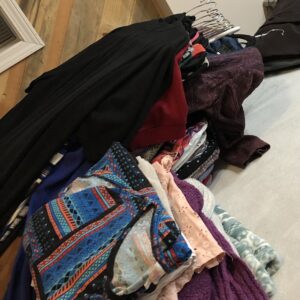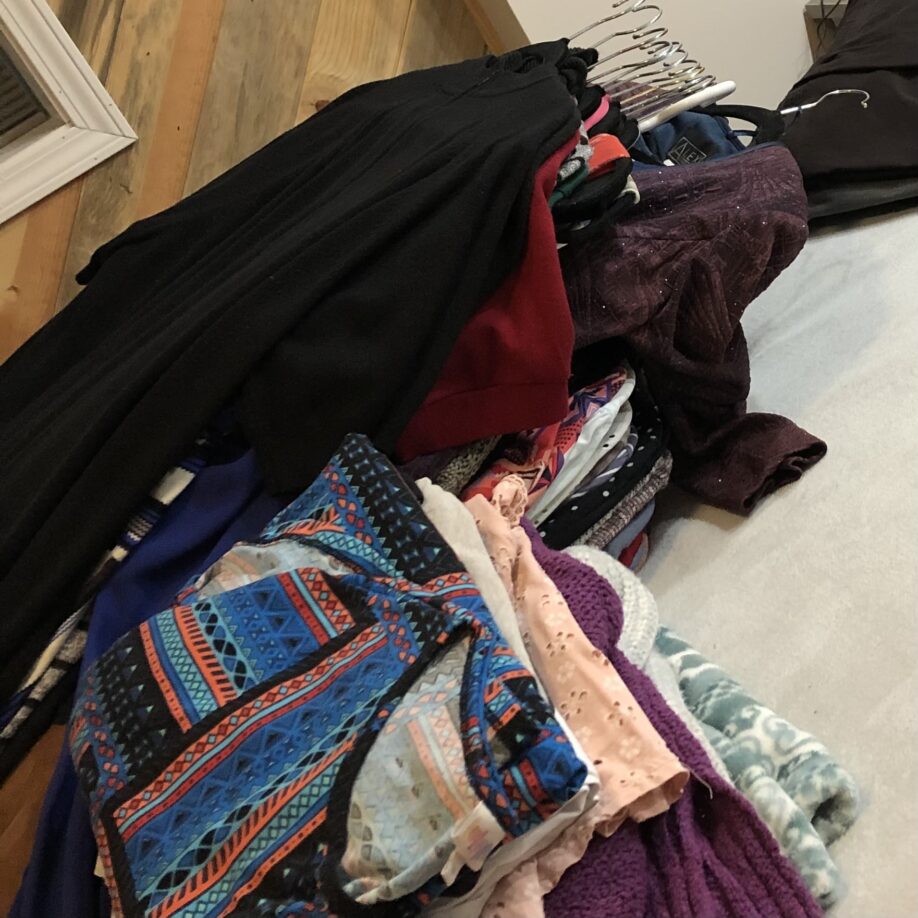 We’re talking about Joseph and In Feast or Famine in the weeks and months leading up to the May 9, 2023 release, but how does Joseph relate to my recent closet cleaning? Maybe because the New Year is a good time for cleaning out the closets of our hearts. I also think Joseph needed to do some heart-cleaning during the second half of his life in Egypt.
We’re talking about Joseph and In Feast or Famine in the weeks and months leading up to the May 9, 2023 release, but how does Joseph relate to my recent closet cleaning? Maybe because the New Year is a good time for cleaning out the closets of our hearts. I also think Joseph needed to do some heart-cleaning during the second half of his life in Egypt.
But first, let’s address those stacks of clothes on my bed in that picture. The recent closet cleaning was a major project and a deep cut. I gave away clothes I’d kept since 1987—some even had shoulder pads! My husband is much more disciplined with his wardrobe. When he buys something new, he cleans out a corresponding older item in his closet or dresser drawer.
Why am I telling y’all about my shirts with shoulder pads and Hubby’s clothing system?
Because this year’s closet-cleaning activity helped me grasp Exodus 13:13 in a whole new way. And I believe Joseph was likely faced with some of the same decisions I made while letting go of those well-loved shoulder-pad shirts.
Deciphering Scripture
Why choose Exodus 13:13? Let’s read it with a couple verses that come before, and perhaps you’ll see my conundrum…
[Moses said to the people,] “After the Lord brings you into the land of the Canaanites and gives it to you, as he promised on oath to you and your ancestors, you are to give over to the Lord the first offspring of every womb. All the firstborn males of your livestock belong to the Lord. Redeem with a lamb every firstborn donkey, but if you do not redeem it, break its neck. Redeem every firstborn among your sons.” Exodus 13:11–13 (emphasis added)Of course, Moses isn’t talking about human sacrifice when he speaks of redeeming the firstborn of Israel’s sons, but what is all that about breaking a donkey’s neck if they wouldn’t redeem it? Who would do that?
And what does it have to do with Joseph or my shirts with shoulder pads?!?!
Seeing the Context
Before we try to apply Scripture’s spiritual concepts to our lives, it’s important to understand the context in which the passage was written. We should first answer these questions:
- Who wrote it?
- To whom was it written?
- When and Where was it written (to learn cultural context)?
- What was happening before, during, and after this moment? (This often gives clues to #5)
- Why was it written? (The why is sometimes tied to which genre the Scripture fits into: history, poetry, or prophecy)
Digging Into Exodus 13:13
Who wrote it:
Moses. Most folks agree that Moses was the likely author of the first five Books of the Bible, what our Jewish friends call the Torah.
To whom:
“There were about six hundred thousand men on foot, besides women and children. Many other people went up with them, and also large droves of livestock, both flocks and herds.” Exodus 12:37–38
When and Where:
In Sukkoth, the day after God delivered the infant nation of Israel from Egypt.
“The Israelites journeyed from Rameses to Sukkoth.” Exodus 12:37
What was happening in the moment:
The night before, the tenth plague had shattered every Egyptian household with the loss of their firstborn sons. But Israel’s firstborns remained safe in their homes, celebrating their imminent freedom and the first time Yahweh’s wrath would Passover them. In the middle of the night, Pharaoh summoned Moses and told him to gather the Israelites and LEAVE IMMEDIATELY! “And also bless me,” he added.
“Because the Lord kept vigil that night to bring them out of Egypt, on this night all the Israelites are to keep vigil to honor the Lord for the generations to come.” Exodus 12:42
Why it was written:
The Jewish word Torah also means instruction. That’s the reason Moses wrote those first five books. All those wonderful stories in Genesis, Exodus, Leviticus, Numbers, and Deuteronomy are meant to instruct God’s people. The Laws given to Moses are the very fiber of their instruction still today–for those who haven’t yet recognized Yeshua as their Messiah.
Why did Moses instruct the Israelites to REDEEM the firstborns of every womb? The simple answer: Because God said so.
What does redeem mean? Miriam-Webster says it means to buy back or repurchase. Isn’t it interesting that God chose that wording? He wanted His children–whom He had to buy back/repurchase from Pharaoh–to buy back/purchase their firstborns from Him.
He wanted the Israelites to recognize the struggle and the value of the struggle for something of such great worth.
What About That Donkey Thing?
But it was that donkey’s broken neck that had never made sense to me until I cleaned out my closet.
“Redeem with a lamb every firstborn donkey, but if you do not redeem it, break its neck.” Exodus 13:13
Every time I’ve read Exodus 13:13 in the past, I wondered, who would break a donkey’s neck rather than redeem it for the Lord? Doesn’t it seem over-the-top stubborn and hard-hearted?
But this time when I read it, I realized they had to redeem the firstborn donkey WITH A SPOTLESS LAMB.
They got something new and had to give up something to keep it…just like my closet cleaning. They had to choose which was more valuable to them–the firstborn donkey or the spotless lamb–and give up one or the other.
Joseph’s New Calling
If you’ve read my recent release, Potiphar’s Wife, you know Joseph fell in love. I REALLY wanted Joseph and his love interest from that book to get married and have fat little Hebrew babies in the sequel, In Feast or Famine. But how could I do that when Scripture clearly states he marries another?
“Pharaoh gave Joseph the name Zaphenath-Paneah and gave him Asenath daughter of Potiphera, priest of On, to be his wife.” Genesis 41:45
Will Joseph redeem his firstborn marriage and offer up the spotless Ahira to whatever future Elohim has for her? Or will he stubbornly hold onto the past, ruin his marriage, and metaphorically break the donkey’s neck?
Can You Redeem the Firstborn?
Both donkeys and lambs were extremely valuable–much more valuable than a 1987 shoulder-padded mock turtleneck. But I purchased that shirt on the first shopping outing with my mom after giving birth to my second daughter. It wasn’t about the shirt. It was the memory, a tender link to the past.
With the coming of a New Year, we all have a splendid opportunity for fresh starts and new beginnings. Whether it’s letting go of a sweet memory to make more of them or releasing long-held bitterness to replace it with forgiveness, my prayer for you today is that you’re willing to redeem that firstborn donkey with a spotless lamb. Give up what feels familiar and valuable–maybe even essential–for the firstborn pack animal that can help you carry your load.
Make the choice to be open-handed. Let’s commit ourselves to let Yahweh give and take away, trusting the same “strong hand” He used to deliver Israel from Egypt and Joseph from prison to work all things for our benefit—never for our harm.
How can we be sure He’s working for our good?
Because they were HIS. Because if we believe Jesus was given as the perfect sacrifice for all sin—including yours, personally—YOU are His, beloved.
Today’s Prayer:
Lord, help me FEEL that I truly belong to You today and fully experience the security that comes with that belonging. Open my hands to allow You to give and take away freely, knowing Your ultimate plan is ALWAYS for my eternal benefit—no matter what my life on earth holds. YOU are my portion and my prize, my very great reward—no matter what’s in my closet.



